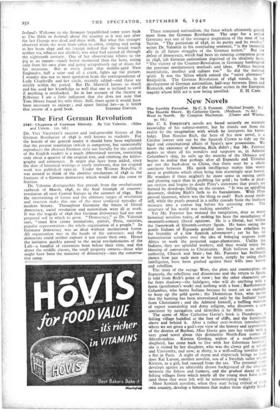The First German Revolution
1848: Chapter. of German History. By Veit Valentin. (Allen and Unwin. 12s. 6d.)
DR. VEIT VALENTIN'S massive and indispensable history of the German Revolution of 1848 is well known to students. For the benefit of the general reader it should have been explained that the present translation (which is competent, but occasionally reproduces the abstract German style too literally for the comfort of the English reader) is a much abbreviated version, containing only about a quarter of the original text, and omitting the biblio- graphy and references. It might also have been added, since the date of historical writings is rarely irrelevant, that the original work was publish,:d 1930-31. Under the Weimar Republic it was natural to think of the abortive revolutions of 1848 as the foretaste of a German democracy which would one day come to fruition.
Dr. Valentin distinguishes five periods from the revolutionary outbreak of March, 1848, to the final triumph of counter- revolution all over Central Europe in the summer of 1849. But the intertwining of forces and the alternate surges of revolution and reaction make this one of the most confused episodes of modern history. Throughout Germany the forces of liberal democracy, social revolution and nationalism were all at work. It was the tragedy of 1848 that German democracy had not any prepared soil in which to grow. " Democracy," as Dr. Valentin says, " must first create institutions, parties, Press, societies, popular representation—the whole organisation of a people." In Germany democracy was an ideal without institutional forms. All organisation was in the hands of the autocracy, and the democrats could neither capture it nor create their own. Hence the initiative quickly passed to the social revolutionaries of the Left—a handful of extremists born before their time, and this drove the middle classes, the small property owners—those who might have been the mainstay of democracy—into the conserva- tive camp. There remained nationalism, the force which ultimately gained most from the German Revolution. The urge for a united Germany was one of the strongest inspiration of the men of the 'forties. "The patriotism of 1848, in its purity and its resolve," writes Dr. Valentin in his concluding sentence, " is the immortal ally in all future struggles of the German nation." But the defeat of democracy, which had been its running companion prior to 1848, left German nationalism deprived of its idealistic basis. "The victory of the Counter-Revolution in Germany bankrupted the previous revolutionary methods and ideas. Politics became materialistic, intellect and culture too." So did the national spirit. It was the 'fifties which coined the " naive pleonasm" Realpolitik. The German Revolution of 1848 stands, in the development of German nationalism, half-way between Stein and Bismarck, and supplies one of the earliest scenes in the European tragedy whose fifth act is now being unrolled. E. H. Cu.i


























 Previous page
Previous page